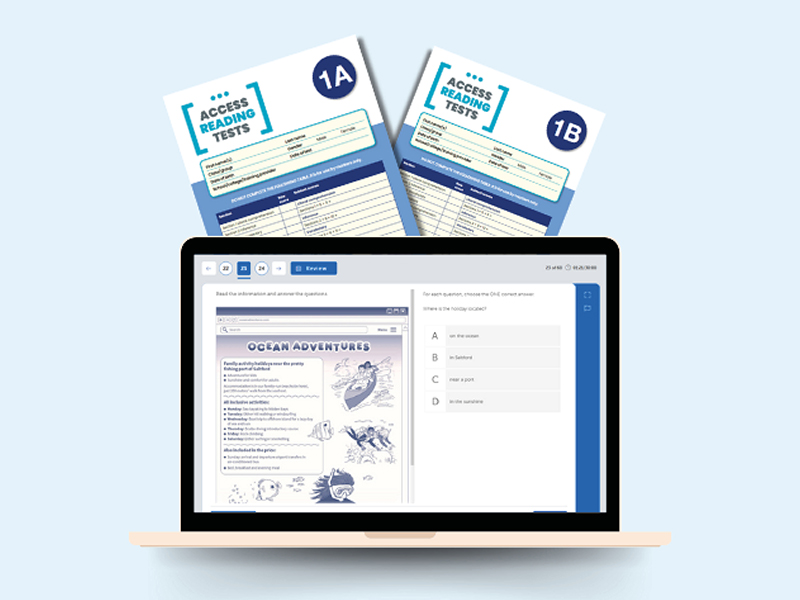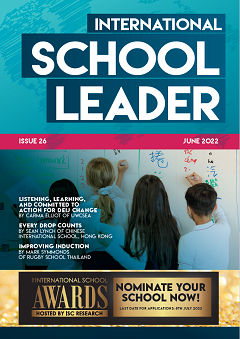Hodder Education
For international educators, finding the right progress assessment can be a tight balancing act; with an increasing number of schools now teaching a combination of curricula across subjects (ISC 2024), assessing progress effectively can present several challenges. For an assessment to produce valid results, it should align with the skills being taught, and must always test content that has already been covered in the classroom. It needs to be appropriately aligned to each student’s learning, and should give teachers valuable, actionable information that provides insight that can make a real difference in the classroom.
Choosing a skills-based assessment, as opposed to a test that has been written to fit with a specific scheme of learning, has many advantages, particularly in an international context. Gone is the rigidity of tests only being relevant at specific times in the school year, or for specific students who have covered a set range of topics – skills-based assessments can be administered flexibly, to fit with the school’s own needs at any given time. This could be whole-cohort baselining at the beginning of a school year, but it might also take the form of individual assessments for those in need of extra support, or to measure the progress of interventions as suitable.
At Hodder Education, we have extensive experience in supporting international schools in all areas of teaching and learning. Colleagues in our established assessment business have gained a deep understanding of what schools need from their tests, particularly in the international schools market, and as such have developed two new suites of assessments for mathematics and rReading, suitable for students aged 11 to 16 and written with the purpose of uncovering gaps in learning and enabling teachers to intervene and help students to succeed.
There are significant benefits associated with using our Access Mathematics Tests (AMT) and Access Reading Tests (ART).
“It is important that students develop the essential skills that underpin the curriculum or hybrid curricula they are learning.”
Accurate benchmarking based on knowledge and comprehension
By focusing and testing core competencies and skills for each subject, you can establish a benchmark and understand the current attainment level of a new student when they join your school, irrespective of the curriculum your school follows, or the student previously followed. For the new editions of ART and AMT, our statisticians analysed results from more than 30,000 test paper submissions (15,000 for each test) throughout 2023 and 2024 from a representative sample. Our thorough trialling and standardisation process, which sees the tests administered in many schools prior to publication, enables you to get an accurate picture of where your students sit among their age group.
- Plan lessons that make an impact
As well as being able to benchmark a learner against the rest of the age group, you can use ART and AMT’s gathered data to perform a gap or strand analysis. After a test is submitted, you get access to the following measures:
Raw score: the total number of marks the learner has scored for that test.
Standardised score: compares a learner’s raw score with the representative sample.
Age-standardised score: adjusts the raw score by age – in months – and compares results to other learners the same age.
Percentile score: shows the percentage of learners who scored lower than your student.
Reading/mathematics age: a quick measure of attainment against the age at which a student’s performance is typical.
As an educator, you can use these measures to spot gaps in learning. For example, if your class performs well against the representative sample but you notice that on the questions about text connections or fractions, they perform lower than average, you can adjust your future lessons to focus on these issues.
- Focus on testing skills over content
It is important that students develop the essential skills that underpin the curriculum or hybrid curricula they are learning. By assessing these core skills, you can identify skill gaps and plan your lessons to encourage the development in identified strands, as well as connect with students and deliver lessons that get them analysing, evaluating, and applying knowledge in meaningful ways. - Reduction of pressure and stress for teachers and students
Moreover, decoupling your test from a specific curriculum means you remove stress and anxiety inducing high-stress testing situations – students can learn with less fear of failure as they know the assessment result will not haunt them for years to come (Carlson, Goforth et al. 2013). Learners will also be reassured that resultant lessons are designed to improve their skills and understanding. - Identify the students who need interventions
The assessments can also be used to identify learners who might need additional interventions such as SEN students. You will be able to coordinate with your SEN team and teaching assistants to make sure that SEN students receive tailored support, and better learning experiences. Then the parallel forms will empower you to track the impact of these interventions.
As for teachers, according to Pearson and Moomaw (2005), tests that work alongside any curriculum may reduce the stress and the pressure teachers are under. ART and AMT shift the focus to individual student growth instead of solely aiming for high test scores. Teachers can also emphasise the learning process over content coverage, giving learners the skills needed to answer questions they might not be able to memorise. All of this often leads to reduced stress levels and increase teacher satisfaction and wellbeing.
Assessment resources from Hodder Education have supported international educators throughout the world including in Europe, the Middle East and Singapore. We use data and reporting to improve learning outcomes and experiences for every learner around the world.
Learn more: https://www.hoddereducation.com/
This is an advertorial from Hodder Education
By Cerys Hadwin-Owen

Cerys Hadwin-Owen is the Senior Lead Product Manager – Assessment at Hodder Education. She researches student and teacher needs at international schools and spearheads the data gathering operations for Hodder Education’s standardised assessments.


